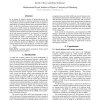10 search results - page 1 / 2 » Learning Predictive Features in Affordance based Robotic Per... |
IROS
2006
IEEE
13 years 10 months ago
2006
IEEE
This work is about the relevance of Gibson’s concept of affordances [1] for visual perception in interactive and autonomous robotic systems. In extension to existing functional ...
INTERSPEECH
2010
12 years 11 months ago
2010
In an attempt to improve models of human perception, the recognition of phonemes in nonsense utterances was predicted with automatic speech recognition (ASR) in order to analyze i...
MLMTA
2003
13 years 5 months ago
2003
Abstract— The prediction of the future states in MultiAgent Systems has been a challenging problem since the begining of MAS. Robotic soccer is a MAS environment in which the pre...
AGENTS
1997
Springer
13 years 8 months ago
1997
Springer
We have been developing Rogue, an architecture that integrates high-level planning with a low-level executing robotic agent. Rogue is designed as the oce gofer task planner for X...
ICRA
2010
IEEE
13 years 3 months ago
2010
IEEE
— We aim to perform robust and fast vision-based localization using a pre-existing large map of the scene. A key step in localization is associating the features extracted from t...

